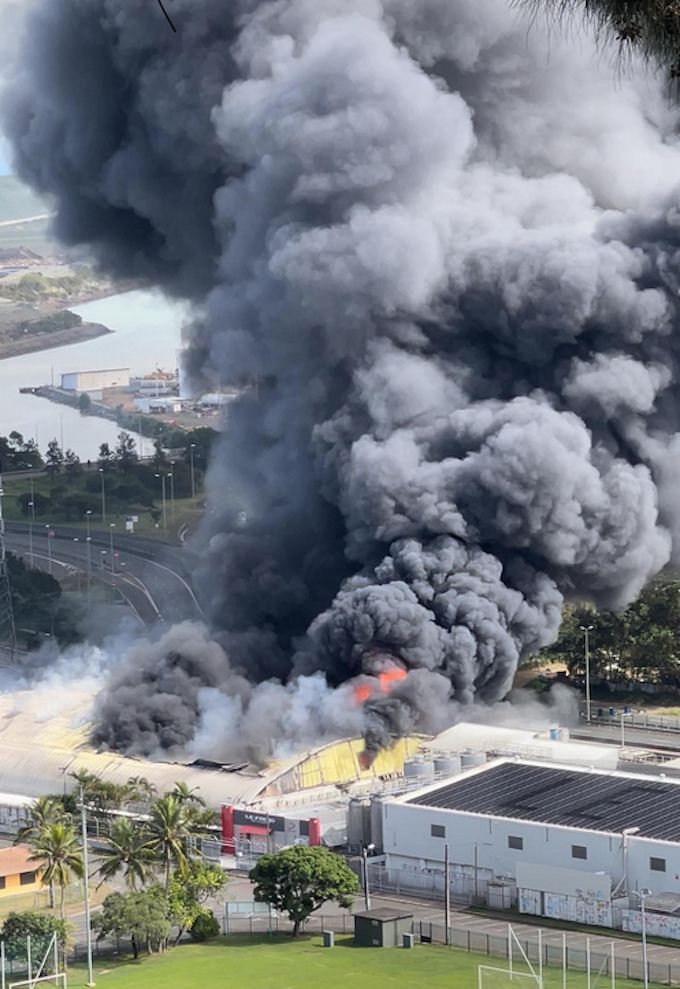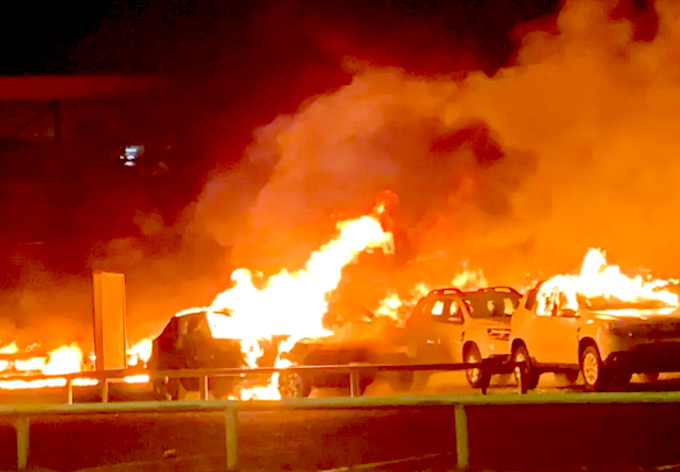By Stephen Wright and Stefan Armbruster
French authorities have imposed a curfew on New Caledonia’s capital Nouméa and banned public gatherings after supporters of the Pacific territory’s independence movement blocked roads, set fire to buildings and clashed with security forces.
Tensions in New Caledonia have been inflamed by French government’s plans to give the vote to tens of thousands of French immigrants to the Melanesian island chain.
The enfranchisement would create a significant obstacle to the self-determination aspirations of the indigenous Kanak people.
- READ MORE: ‘A lot of fire, violence’: Nouméa erupts as protests halt New Caledonia
- NZ foreign minister Peters cancels New Caledonia visit as unrest erupts
- Botched prison mutiny, protests ahead of New Caledonia constitution vote
- Other New Caledonia reports

“Very intense public order disturbances took place last night in Noumea and in neighboring towns, and are still ongoing at this time,” French High Commissioner to New Caledonia Louis Le Franc said in a statement today.
About 36 people were arrested and numerous police were injured, the statement said.
French control of New Caledonia and its surrounding islands gives the European nation a security and diplomatic role in the Pacific at a time when the US, Australia and other Western countries are pushing back against China’s inroads in the region.
Kanaks make up about 40 percent of New Caledonia’s 270,000 people but are marginalised in their own land — they have lower incomes and poorer health than Europeans who make up a third of the population and predominate positions of power in the territory.
Tens of thousands of people in the French overseas territory of New Caledonia have taken to the streets in protest of French President Emmanuel Macron’s plans to reform New Caledonia’s electoral system. At least eight pro-independence activists had already been arrested before… pic.twitter.com/bnzRw22UWy
— red. (@redstreamnet) May 13, 2024
Buildings, cars set ablaze
Video and photos posted online showed buildings set ablaze, burned out vehicles at luxury car dealerships and security forces using tear gas to confront groups of protestors waving Kanaky flags and throwing petrol bombs at city intersections in the worst rioting in decades.

A dusk-to-dawn curfew was imposed today and could be renewed as long as necessary, the high commissioner’s statement said.
Public gatherings in greater Noumea are banned and the sale of alcohol and carrying or transport of weapons is prohibited throughout New Caledonia.
The violence erupted as the National Assembly, the lower house of France’s Parliament, debated a constitutional amendment to “unfreeze” the electoral roll, which would enfranchise relative newcomers to New Caledonia.
It is scheduled to vote on the measure this afternoon in Paris. The French Senate approved the amendment in April.
Local Congress opposes amendment
New Caledonia’s territorial Congress, where pro-independence groups have a majority, on Monday passed a resolution that called for France to withdraw the amendment.
It said political consensus has “historically served as a bulwark against intercommunity tensions and violence” in New Caledonia.
“Any unilateral decision taken without prior consultation of New Caledonian political leaders could compromise the stability of New Caledonia,” the resolution said.
Un supermarché (les Noumeens reconnaîtront le célèbre mini marché) est en train d’être pillé pic.twitter.com/LiJV4lJ9cl
— Charlotte Mannevy (@CMannevy) May 13, 2024
French Interior Minister Gérald Darmanin told his country’s legislature that about 42,000 people — about one in five possible voters in New Caledonia — are denied the right to vote under the 1998 Noumea Accord between France and the independence movement that froze the electoral roll.
“Democracy means voting,” he said.
New Caledonia’s pro-independence government — the first in its history — could lose power in elections due in December if the electoral roll is enlarged.
New Caledonia voted by small majorities to remain part of France in referendums held in 2018 and 2020 under a UN-mandated decolonisation process. Three ballots were organised as part of the Noumea Accord to increase Kanaks’ political power following deadly violence in the 1980s.
Referendum legitimacy rejected
A contentious final referendum in 2022 was overwhelmingly in favour of continuing with the status quo. However, supporters of independence have rejected its legitimacy due to very low turnout — it was boycotted by the independence movement — and because it was held during a serious phase of the covid-19 pandemic, which restricted campaigning.
Representatives of the FLNKS (Front de Libération Nationale Kanak et Socialist) independence movement did not respond to interview requests.
“When there’s no hope in front of us, we will fight, we will struggle. We’ll make sure you understand what we are talking about,” Patricia Goa, a New Caledonian politician said in an interview last month with Australian public broadcaster ABC.
“Things can go wrong and our past shows that,” she said.
Confrontations between protesters and security forces are continuing in Noumea.
Darmanin has ordered reinforcements be sent to New Caledonia, including hundreds of police, urban violence special forces and elite tactical units.
Copyright ©2015-2024, BenarNews. Used with the permission of BenarNews.

